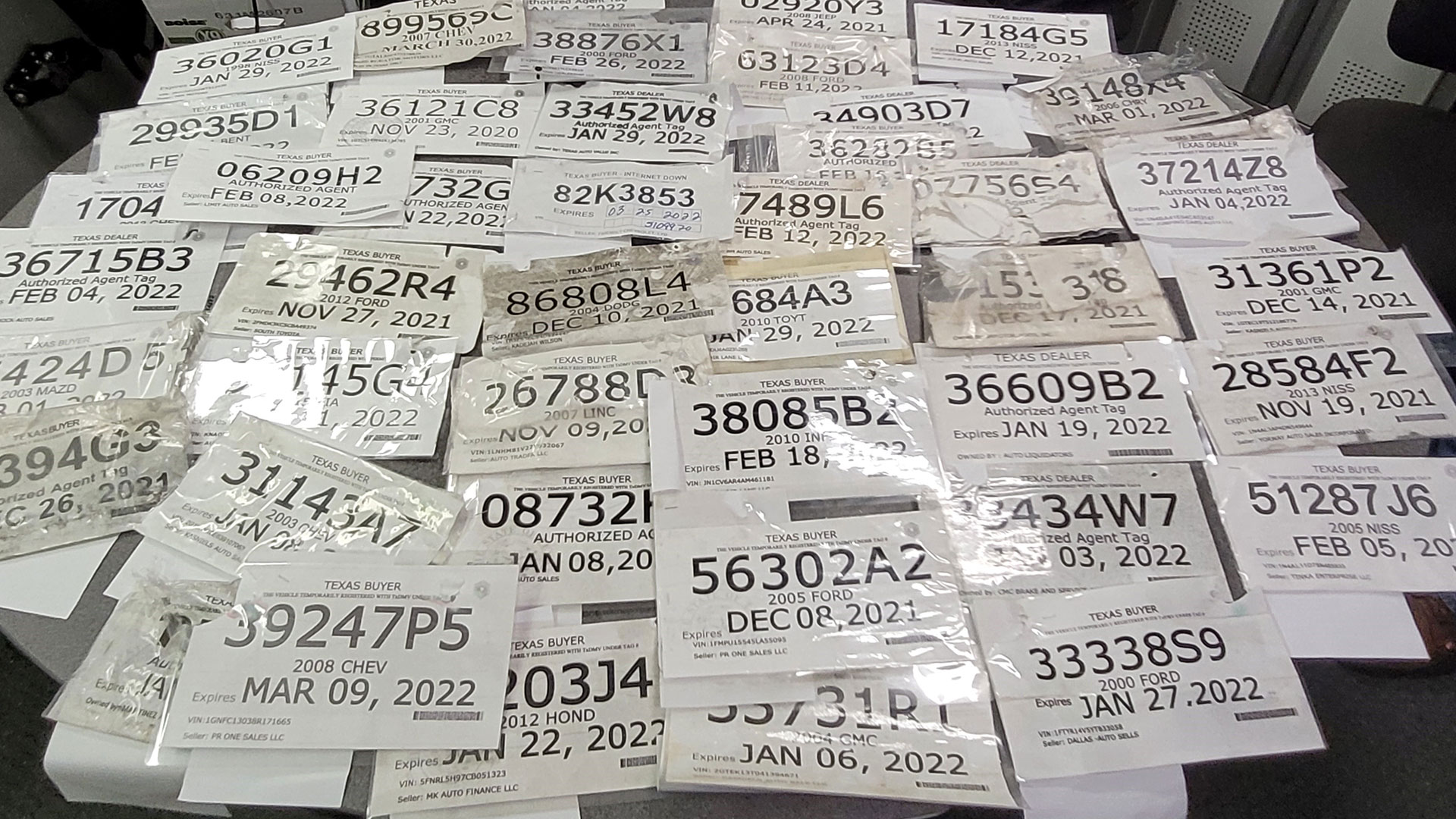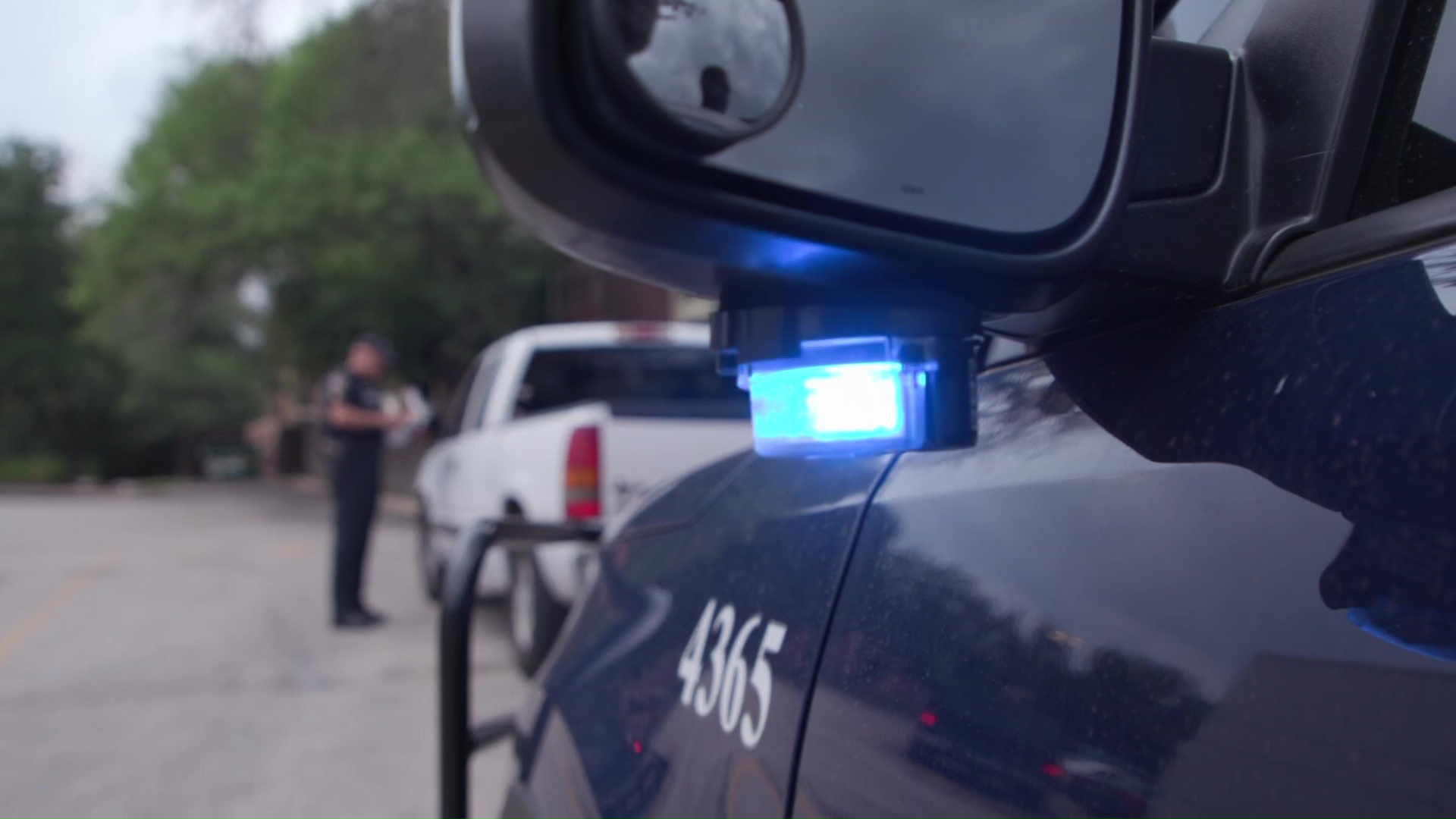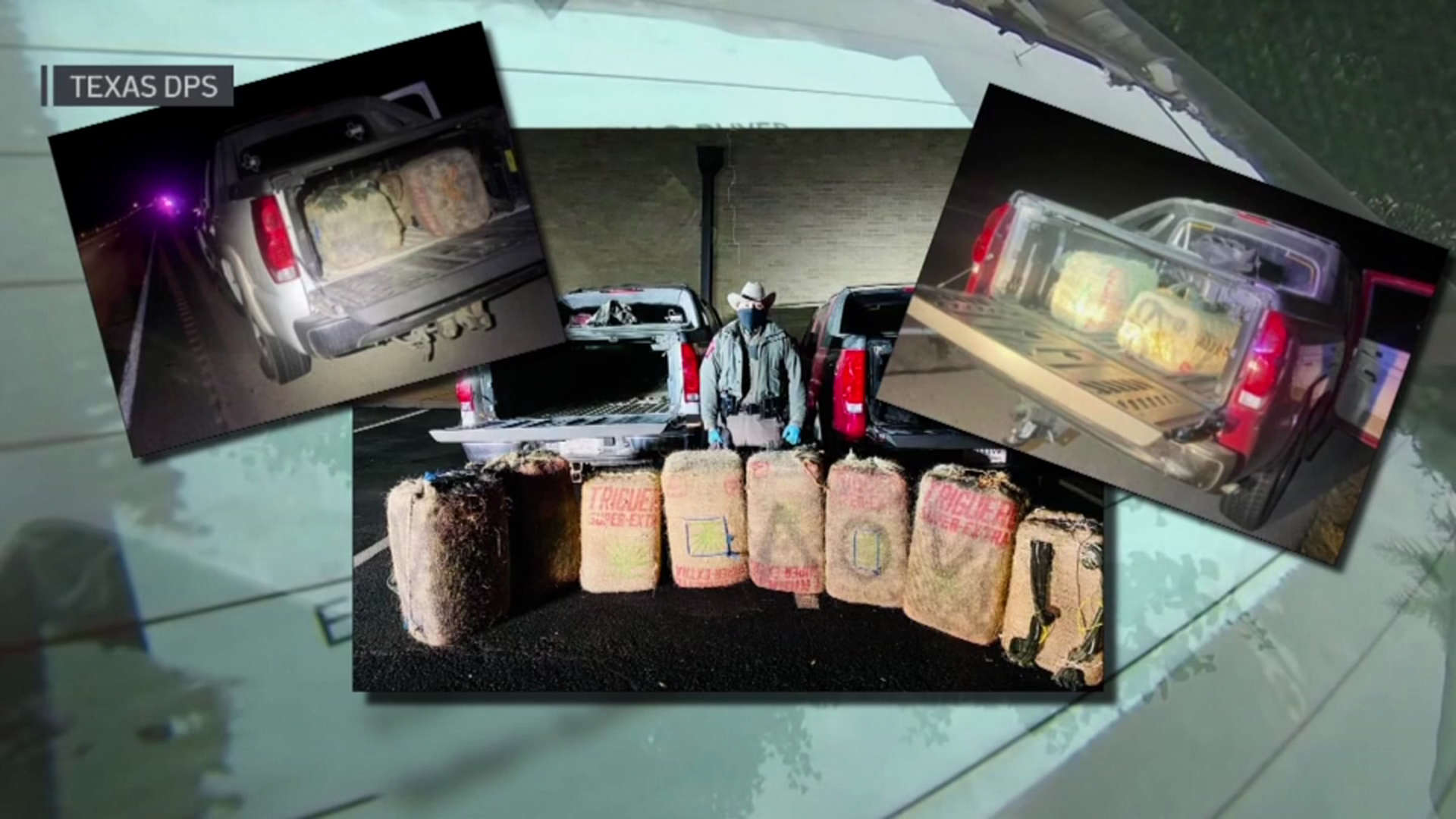In an emergency meeting Thursday, the Texas Department of Motor Vehicles took more steps to combat the illegal sale of paper license tags by ordering staff to draft plans for how to fingerprint people who apply for car dealer licenses and to immediately cut off dealers suspected of fraud.
The moves come after a months-long NBC 5 investigation exposed how crooks have been able to obtain dealer licenses, gain access to the DMV's internal system, and then sell temporary paper tags, reaping millions in illegal profits.
During Thursday's meeting, the DMV board directed staff to draft a plan for fingerprinting car dealers, to verify the identity of those seeking dealer's licenses.
Get top local stories in DFW delivered to you every morning. Sign up for NBC DFW's News Headlines newsletter.
The DMV also approved a rule that will allow the agency to immediately turn off the license of any dealer suspected of selling fraudulent tags, removing the previous lengthy administrative process that allowed suspected crooks to continue printing and selling tags long after they've been identified as a problem.
NBC 5 Investigates found that some dealers were able to print thousands and thousands of tags even after law enforcement flagged those dealers for suspected fraud.
The fraudulently issued tags are often created with bogus names, addresses, and VIN numbers that are entered into the DMV's system. Law enforcement officials said this effectively creates "ghost cars" that are difficult for law enforcement to track if the vehicle is involved in a crime.
"This accident never would have happened if the driver did not obtain illegal paper tags through your failed system," said Tawny Solbrig, a mother testifying about her 18-year-old son Terrin who was struck and killed by a car on the road with a fraudulent paper tag.
NBC 5 Investigates has obtained records showing that tag was issued by a car dealer that was later investigated by the FBI.
Federal prosecutors charged the owner with wire fraud for allegedly selling hundreds of thousands of Texas tags and the FBI is still trying to locate him.
Solbrig said the DMV should have moved faster to prevent that dealer from printing tags and credited law enforcement for stepping in.
"This dealership has been indicted because of those people over there", she said motioning toward law enforcement officials in the room, "not because of y'all - y'all failed the system," said Solbrig referring to the DMV board.
Manny Ramirez, a member of the DMV board, told NBC 5 Investigates the steps taken Thursday should have been taken long ago.
"I think that this is a long time coming. I think that we should have done this years ago, but we did it today and I'm proud of that," Ramirez said. "I am proud that the board prioritized this issue and said this is our number one concern."
At Thursday's meeting, the DMV's executive director Whitney Brewster pledged to work more closely with law enforcement officials to crack down on criminal activity involving tags.
She said the agency could not implement the chance sooner because they needed more authority from the state legislature, which they received last year.
"So the agency is required to follow Texas law," said Whitney Brewster, DMV Executive Director.
Brewster said her department could not implement tougher rules until the Texas Legislature passed a new law last summer.
"Now with that authority, the board took on today, we can start immediately working on cutting off bad actors," said Brewster.
The impact of that delay is staggering. By one law enforcement estimate, 1.2 million illegal paper tags were sold in 2021.
PAPER TAG NATION
Officers at the state's top paper tag fraud enforcement unit in Travis County have complained for years that the DMV has been slow to act to stem the tide of illegally sold tags.
Police officers who attended the meeting Thursday said it will take much more than what the board did on Thursday.
Some even complained that the DMV still does not give police real-time access dealer information, making it harder for officers to track down so-called "ghost cars" with fraudulent paper tags created by dealers who enter false names and addresses into the system.
"In the event of a homicide, kidnapping, aggravated robbery, what do we do? Wait until Monday," asked David Kohler a sheriff's deputy from Central Texas.
Board members assured the officers they are listening.
"I think about this every night. I'm on it. You ask her. I call her every day," said Charles Bacarisse, chairman of the DMV Board, as he indicated that he contacts Brewster daily to discuss the tag fraud problem.
The agency pledged to meet with police to strategize soon.
"If there are ways that need to improve our process so that law enforcement gets what it needs, we are willing to pursue those things," said Brewster.
A recent NBC 5 investigation showed how officers warned the DMV two years ago of one major security flaw in the system, yet that loophole was not fully closed until days after NBC 5 Investigates questioned the agency about why it had not taken more action to prevent fraudulent VIN numbers from being used to obtain tags.
Brewster acknowledged Thursday that there is "room for improvement" in the agency's relationship with law enforcement and said her agency was now working with police in Dallas and Houston on more enforcement efforts to catch people purchasing and selling illegal tags.
Just last week, Dallas police ran a day-long operation to stop vehicles with fraudulent tags in a high-crime area of the city. Officers recovered stolen cars with fraudulent tags, seized weapons, and arrested people suspected of involvement in other crimes. Police across the state have told NBC 5 Investigates that the illegally sold tags have become a go-to tool for criminals who want to conceal the identity of a vehicle.
In some cases, the DMV has acknowledged fraudulent tags are being sold by people who obtained a car dealer license by using a stolen identity. Thursday the board asked staff to quickly create a plan for fingerprint license applicants to try to curb that criminal activity.
Once rules are drafted by staff they will be published for public comment and brought back to the board for final changes and approval.
One board member, Stacey Gillman, who represents car dealers expressed concerns Thursday about fingerprinting franchise car dealers saying that those dealers are not responsible for the fraud.
A DMV advisory committee recommended excluding franchise dealers from the fingerprinting rules, agreeing that the problem was primarily tied to small dealers and shell companies that were created for the purpose of illegally selling tags.
When NBC 5 Investigates first questioned Brewster in December about why the department was not fingerprinting dealers she said that the department believed it would need approval from the legislature to begin fingerprinting dealers. On Thursday, the agency said it would continue exploring whether it needed authorization from the legislature but said it would continue to draft a plan to fingerprint as it seeks more guidance on the legality of the proposal.
The DMV board is expected to meet again in early February to consider the fingerprinting rules that will be drafted by staff.
Some at Thursday's meeting, including a group of county tax collectors, argued paper tags simply need to be scrapped. They said the system has lost so much credibility the DMV needs a new type of temporary tags.
DMV board members agreed to consider that, as they try to deal with a problem they acknowledge has gotten way out of hand.
PREVIOUS REPORTS
- June 12, 2023 - Gov. Abbott signs law eliminating paper license plates in Texas
- May 24, 2023 - Bill to Eliminate Paper License Plates in Texas Passes Texas Senate
- March 27, 2023 - Texas DMV's New Paper Tag Design Easily Counterfeited, Police Say
- Nov. 17, 2022 - Texas DMV Redesigns Paper License Tags to Include New Security Features
- Nov. 15, 2022 - Police Searching for Paper Tagged 'Ghost Car' in Deadly Grand Prairie Chase
- June 1, 2022 - Police Make Bogus Tag Bust Tied to Social Media Ads
- May 18, 2022 - TxDMV Names New Executive Director Amid Paper Tag Crisis
- May 17, 2022 - Vehicle Used in Dallas Salon Shooting Had Paper Tag
- May 12, 2022 - Ads for Fake Tags Persist, Despite Facebook, TxDMV Efforts
- May 4, 2022 - Texas' Paper Tag Problem Compounded by Small Dealers Misusing Them
- May 3, 2022 - Dallas Police Shut Down Accused Fake Paper Tag Dealer
- April 26, 2022 - Texas House Set to Hold Paper Tag Hearings
- April 14, 2022 - Texas DMV Cracks Down on Dealers Selling Temporary Paper Tags
- April 13, 2022 - TxDMV Closes Inspection Loophole That Put Unsafe Cars on Roads
- April 12, 2022 - Dallas Police Go Undercover to Fight Illegal Paper Tags
- April 7, 2022 - Police Warn of Fake Paper Tags Used to Cheat Car Buyers
- April 5, 2022 - Texas Senate Will Investigate Illegal Paper Tag Crimes, Smuggling
- March 9, 2022 - Texas Paper Tag Crime Danger Extends Nationwide
- March 5, 2022 - Texas House Will Hold Hearings on Paper Tag Mess
- Feb. 28, 2022 - License to Smuggle: Drug Cartels and Human Smugglers Use Paper Texas Tags to Evade
- Feb. 15, 2022 - Fort Worth Police Announce Special Operation Targeting Paper Tags
- Feb. 14, 2022 -- Crash Victim's Parents Want More Cops to Police Paper Tag Fraud
- Feb. 13, 2022 - More Funding Need to Fight Criminals Using Bogus Paper Tags: Police
- Feb. 10, 2022 - Police Report Drop in Fraudulent Tags But Warn Crooks Are Adapting
- Feb. 9, 2022 - Texas DMV Shuts Down Six More Dealers Suspected of Selling Paper License Tags
- Feb. 7, 2022 - TxDMV Director Resigns Amidst Paper Tag Mess
- Jan. 27, 2022 - TxDMV Takes Emergency Action to Keep Crooks From Selling Paper Tags
- Jan. 21, 2022 - Dallas Police Operation Targets Fraudulent Paper Tags
- Jan. 17, 2022 - Recording Shows Police Warned TxDMV of Paper Tag Security Flaw Years Ago
- Dec. 16, 2021 - DMV Committee Recommends Fingerprinting Some Dealers to Slow Paper Tag Fraud
- Dec. 14, 2021 - Texas House Transportation Chair Vows to Stop Paper Tag Fraud
- Dec. 6, 2021 - Texas DMV Boss Deflects Blame for Paper Tag Debacle
- Nov. 23, 2021 - Illegal Paper Tags Costing Texas Taxpayers and Toll Roads Millions
- Nov. 10, 2021 - Suspected Paper Tag Peddler Shut Down Tuesday, Reopens Wednesday: Investigators
- Nov. 8, 2021 - How Texas Paper Tags Became a $200M Criminal Enterprise: NBC 5 Investigates




